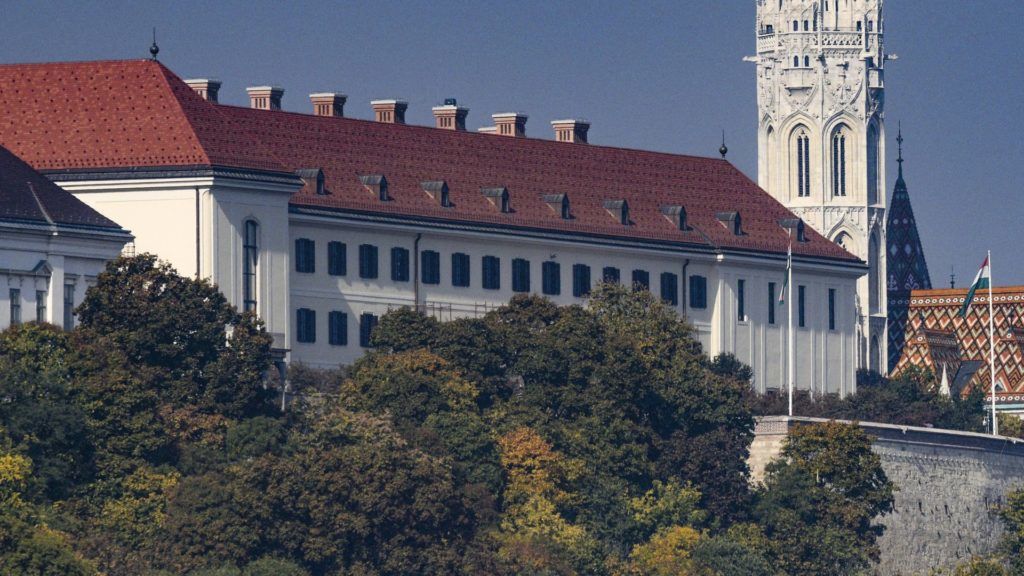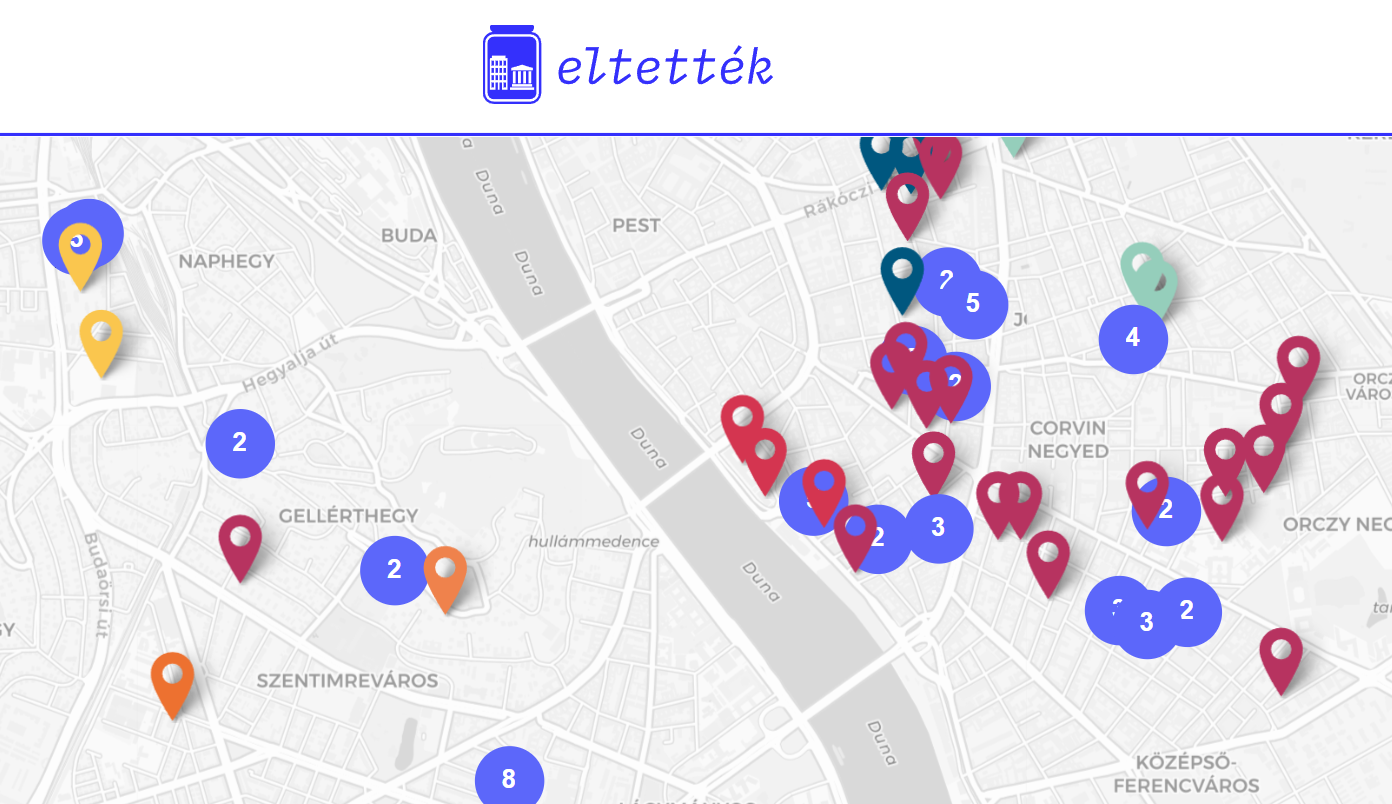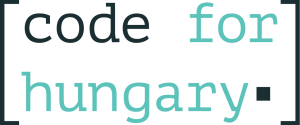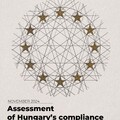After the pre-election year of 2021, which was all about the ruling party's stocking up, 2022 did not bring more integrity into public life in Hungary either. There was plenty for the corruption watchdog K-Monitor to do! In the spring, we intensively followed the controversial parliamentary election campaign, after that the EU’s not very transparent financial conditionality mechanism. We have we continued to improve access to information in the ever-shrinking publicity in a number of ways and presented alternatives to authoritarian and exclusive exercise of power.

Looking up on the Carmelite Monastry, office of the Prime Minister (pic source: HVG)
Last year we were truly inspired by the many people who supported our activities with donations, volunteer work and professional advice. Thank you for being with us in! Our review of the year's events regarding public money and corruption can be found here.
We made information available that should be public
In the shrinking public sphere of the last decade, it has become increasingly difficult to obtain public information on key government decisions: these are usually taken in closed processes and fast-tracked procedures. Thus, it has become our paramount task to publish data that the state does not make available or outright withholds from the public. In 2022, we have submitted 70 data requests to various state and municipal institutions and users of public funds. In most cases, data controllers took advantage of a government emergency decree issued in 2020 and delayed responding to us for 90 days. Often, instead of a substantive response, the three-month wait was followed by a rejection, or we did receive a response at all.
In such cases, we have turned to court. We have gone to court to find out the cost of Viktor Orban and his family's trip to Rome last year on a plane belonging to the national defence, to obtain contracts for the new building of the Ministry of Finance, which was renovated with billions of forints, or to receive documents from cabinet meetings that are hidden from the public. We have also gone after the Hungarian Chamber of Court Bailiffs, involved on one of the most serious corruption scandals of the last years, which still tries to hide contracts signed by its leadership already in detention.
In 2022, we had a total of thirteen lawsuits, all but one of which we won. In the latter case we lost against the Ministry of the Interior, where we sought to obtain background studies drafted by the Boston Consulting Group for the ongoing healthcare reform that is performed without public consultation. We appealed to the Constitutional Court against the final decision. However, in our cases we not only pursued the obtention of data, but we also wanted to improve case law and judicial practice on freedom of information. This was particularly important for us, as we closely followed the adoption of new litigation rules in the framework of the conditionality mechanism and the entry into force of the Tromsø Convention, which was established by the Council of Europe and to which Hungary signed up to new obligations in favour of data applicants.
In the course of our work monitoring public money, we obtained the bidding documents for the 35-year highway concession won by top government crony Lőrinc Mészáros and his circle. We also drew the Commission’s and the media’s attention to the fact that the government neglected to fulfil its anti-corruption commitments by extending the deadlines of its anti-corruption strategy. We informed the public that the government had given HUF 130 billion subsidies to foreign investors to build three battery factories and HUF 7 billion to a Russian company's deodorant factory, well after the Russian aggression had started. We wrote in detail that the extremely valuable real estate of the former Lipótmező mental hospital was donated by the government to be used to build a private school. We also discovered that in the midst of the crisis, there was money left over to resurrect the controversial and useless shaman drum made for the Hungarian pavilion of the Milan World Exhibition seven years ago. We also found evidence that a billion-forint subsidy was given to the sports club FTC by the Hungarian Electricity Works when people were struggling to pay their electricity bills. FTC’s president is the party director of Fidesz, Gabor Kubatov.
In order for the citizens to be informed about the well and good, the government spends hundreds of billions of forints on propaganda. In the summer and autumn, we also wrote unveiled what this money was exactly spent on. It is rare for the government to take action in response to our activities, but this year it did: Following our public interest report, the CEO of the Hungary Helps Agency resigned from his conflicting position in the Christian Democratic People's Party.
Mapping and analysing information

For key topics, we go beyond getting the data and making it available, we also present information in a digestible format. With the help of the ‘eltették.hu’ (They put it away) site, we have made it possible to follow the fate and location of hundreds of public properties transferred to public interest asset management foundations run by political appointees. Indeed, one of the biggest losses of public assets in recent years has been the transfer of assets to these foundations. Assets worth around EUR 3 billion have been transferred to them.
The location and details of the public funds pumped into the reconstruction of City Park were shown in the ‘Liget Monitor’, but we also mapped public investments that were halted due to the crisis. This gave an insight into the priorities of the government. The symptoms of the crisis and the zeroed state funds are also shown in our community information collection "The country is closing down", launched jointly with Átlátszó.hu, which attracted nearly 200,000 visitors and is constantly updated to show the service providers and public institutions closed down since the summer.
Also together with Átlátszó.hu, we showed how the government abusively uses the category of ‘investment of national economic interest’ in order to exempt prestige investments, projects of favoured multinationals or its clientele’s construction projects from the otherwise mandatory procedures, such as obtaining various permits or consulting affected stakeholders.
We have been following the distribution of agricultural subsidies in Hungary for ten years now, and with it the fate of hundreds of billions of forints a year. This year, in addition to our regular annual analysis, we have created a dedicated website and a detailed search engine for this topic, allowing users to search and download the subsidy data behind our analysis. In 2022, our open source app (‘Közérthető Költségvetés’ – ‘Comprehensible Budget’) made the budgets of five municipalities more transparent, including Józsefváros, Gyöngyös and the 1st district.

Even more importantly, this year we have once again produced an interactive website with more than 1500 lines on the 2023 central budget. The opacity of public spending is shown by the fact that the budget, which was passed into law in the summer, was completely rewritten by decree by the Orban government between Christmas and New Year. By now we event published the visualisation of the updated budget to show how the austerity measures affected various institutions and social groups. Whereas a few years ago the end of the year was all about the leftovers handed out to mates and proteges, now it's the lean years coming, and instead of handouts, it's cutbacks that were announced.
Almost every week we published new data and information that was important news for the press. Our 85 blog posts were read by 270,000 people this year, and our Facebook posts received almost 37,000 likes. In 2022, K-Monitor was cited more than 600 times in the media. We were even featured in Le Monde, Politico and the New York Times. In fact, former US President Obama gave us a shout out at Stanford!
If you would contribute to the fight against corruption in Hungary,
Support K-Monitor with a gift!
Political power conserved, inflation bomb set off
It seems like years since the national elections that took place last April, but the three quarters of a year since then have not brought us much closer to seeing clearly how much money the parties, candidates and the forces supporting them have exactly spent, and where the funds came from. It was not up to us.
In a policy paper earlier this year, K-Monitor made suggestions on how to make the Hungarian party funding system more transparent and accountable, and we also suggested that parties should feel free to publish their incomes and expenditures in more detail than required by law. During the campaign, we have closely monitored how public bodies and officials abuse their positions to support the campaign of the governing party, and what other practices have been used to get seemingly independent institutions to support the campaign of a party or candidate.

We have presented how 3.7 billion forints of public money was spent on the government's press campaign for the referendum “to protect families”, which was held at the same time as the elections. Together with Transparency International Hungary and the think tank Political Capital we have also shown the overwhelming preponderance of billboards in public spaces in favour of the governing parties, and how much more money than allowed was burned by the governing parties in the campaign at list price.
In order to ensure that voters do not only assess the election offer based on the messages of the parties and their communications holdouts, but also encounter real public policy issues, we have relaunched ‘Voksmonitor’ in cooperation with our Czech partner developer of the tool, KohoVolit. Voksmonitor is a calculator that shows which political parties are closest to the user based on their responses given to relevant questions on policy and public life. At the end, the vote was decided not by political programmes, but by fears over Russian aggression, the opposition's communication gaffes and the hundreds of billions of forints of outflow the government used to create the illusion of opulence ahead of a four-year cycle of austerity before the election. But the rebates and handouts have backfired: prices have gone out of control.
Promoting alternatives to authoritarian governance
We have long recognised that the best way to fight corruption is through active participation in public affairs. Creating the conditions for public participation can broaden the range of citizens who demand a say in decisions that affect their communities. It can also shape the political culture if decision-makers get used to consulting citizens every four or five years. This is why, as well as holding people accountable for transparency, we are making it a priority to strengthen community participation. We participate in the Capital's citizens' task force and actively campaign for participatory budgeting processes.
In Debrecen, for example, we participated with the Alternative Communities Association in the first participatory school budget in Hungary: the students of Medgyessy Secondary School decided on the fate of 300,000 HUF in a democratic process lasting six months. A practical guide to the programme was also produced.
Together with our partners in the region Funky Citizens (RO), Oziveni (CZ) and Watchdog Poland, we launched a research project to investigate how government centralisation has affected local governments in the region and how local communities have responded with counter-strategies. We also presented the research at our third Conspiracy for Democracy workshop, where we discussed our work on local participation with a dozen activists from Central and Eastern Europe. At another event, we reflected with locally active citizens, local government workers and experts and researchers on how to reach out to residents on issues that affect their neighbourhoods. We talked about what it would take to make local government not just about concrete and legislation, but about people's real problems.
Last year, we created PARTIMAP, our open-source participatory mapping platform, to help make better use of national and EU urban development funds. This platform can help municipalities and advocacy groups to assess the needs of local residents for community development, test their ideas and monitor the effectiveness of completed projects. We are proud that the Budapest Public Transport Center, among others, used our tool to plan the location of new public bike (BUBI) stations. Here's the demo, that shows how a questionnaire can be created, free and easy!
On the occasion of the mid-term of the local government cycle, we examined the transparency of the municipalities led by the politicians who joined our transparency campaign ‘This is the Minimum!’ in 2019 and reached out directly to the worst performers.
Safeguarding EU funds
In 2021, we were already dealing intensively with the issue how the EU could act to protect EU funds in a country where corruption becomes systemic. We welcomed the creation of the so-called conditionality mechanism and the linking of anti-corruption measures to the approval and disbursement of EU funds to Hungary. At the same time we have criticised on several occasions the lack of transparency and public consultation in the negotiations between the European Commission and the Hungarian government and in the development of Hungarian anti-corruption measures.
In detailed and widely circulated English and Hungarian analyses, we point out the shortcomings of the measures undertaken by the government, whether on asset declarations, public procurement, reform of the criminal procedure, freedom of information issues or on those issues that were not included in the autumn package of measures. Together with the Hungarian Helsinki Committee and TI Hungary, we assessed the package as a whole, as well as its implementation. We believe that it is also thanks to our papers and analyses that the EU did not unconditionally accept the incomplete measures taken without real commitment. In December K-Monitor decided to apply for membership of the Anti-Corruption Work Group, which was set up under pressure from the EU and of which our colleague, Orsolya Vincze became a member. The Work Group, which has a purely consultative role, will not work wonders, but it is important for us to follow the development of government anti-corruption legislation in every possible way, to keep our proposals on the table and to provide information on the measures.
Together with our partner NGOs, we also participated in the consultation preceding the EU 2022 Rule of Law Report (and 2023) for which we wrote a joint contribution (2022 and 2023) on the problems affecting the state of the rule of law in Hungary. This is important in order to ensure that the EU and the public do not only see the government's position on important issues such as law enforcement and the effectiveness of anti-corruption measures.
Technology and knowledge to fight corruption
In the spring, we concluded our six-part corruption watchdog series with the Hungarian Civil Liberties Union, which highlighted and analysed how the state used the epidemic response to fuel corruption and continue dismantling the rule of law ahead of the elections.
We also continued to study the prevalence and regulation of algorithms used in public administration. The government is spending and will spend billions on automated decision-making in public administration, wherever possible. While the move could have important anti-corruption effects and make public institutions more efficient, it also comes with a number of risks.
We have also continued our work on corruption in maternity care in 2022. We pointed out that, in addition to a stricter ban on informal payments and a wage decompression for doctors, many more steps would be needed to ensure that all Hungarian women, wherever they live in the country, can give birth to their babies in equally good conditions. Together with the online portal 24.hu, we have launched a series of articles on the anomalies of informal payments and the obstetric system. We showed how the system of informal payments has not disappeared completely, but has been transformed, and how the funding system encourages unnecessary interventions or false reporting. In collaboration with the news portal 444.hu, we made a video to explore how care has changed since the ban on informal payments. For this work, 444.hu's video maker, Júlia Halász, was awarded the Hégető Honorka Prize. We also continued to run our ‘This is how I gave Birth’ birth experience survey and repeatedly draw attention to the fact that the lack of proper restructuring of the public obstetric system is leading to the cannibalisation of public care.
 K-Monitor has always stood out among NGOs for its use of digital tools, and over the past 12 months we have invested more time and energy in organising the Code for Hungary community of volunteer developers to support the activities of CSOs and activists through IT development. The code for current projects is now available on GitHub. In the first half of the year, we talked to a number of organisations and initiatives about what IT and data-based solutions they could use in their work. Building on these, we held two brainstorming meetups and several workshops aimed at bringing together different technology expertise. The community members were the ones who created the eltettek.hu or the Agriculture subsidies monitor. We are extremely proud that our active community members won the Google News Initiative competition with their “Koffair” idea
K-Monitor has always stood out among NGOs for its use of digital tools, and over the past 12 months we have invested more time and energy in organising the Code for Hungary community of volunteer developers to support the activities of CSOs and activists through IT development. The code for current projects is now available on GitHub. In the first half of the year, we talked to a number of organisations and initiatives about what IT and data-based solutions they could use in their work. Building on these, we held two brainstorming meetups and several workshops aimed at bringing together different technology expertise. The community members were the ones who created the eltettek.hu or the Agriculture subsidies monitor. We are extremely proud that our active community members won the Google News Initiative competition with their “Koffair” idea
The engine room reports
It's not as spectacular a job to maintain the important tools we've owned in recent years, but we spend a lot of time doing it. Every day, we've been expanding and improving K-Monitor's popular public funds - corruption database, which contains around 50,000 articles. As well as recording new articles, we're constantly working to make old, lost material available again. We are happy to work on it, as it is consulted by more than 260,000 people every year. We appreciate the help of the dozens of volunteers without whom these articles would disappear into oblivion.
We've also been constantly updating and maintaining our NER Hotel app (Hotel Oligarch), which makes restaurants and hotels connected to politically exposed persons searchable on a map interface. An English version of the site will be available soon. We have also been working on the maintenance of our public procurement monitoring system redflags.eu, jointly operated with TI Hungary.
In 2022, eight K-Monitor staff members, two trainees and many volunteers worked to ensure that all of this was done to a high professional standard. The Sigrid Rausing Trust, the Open Society Foundation and the National Endowment for Democracy have been the most significant supporters of our activities. We are very proud of the HUF 3 million in donations we received from our micro donors and the nearly HUF 1.5 million donation we received from the 1% tax contributions. Without them, many of our projects could not have been completed.
We have a lot to do next year as well. We will be monitoring the government's anti-corruption commitments, which are a condition for receiving EU funds, and testing new institutions (Integrity Authority, new rules of criminal procedure, accelerated litigation in the cases of public data) that are supposed to help fight corruption, but are worthless if there is no one to use them! We will continue our legal action against secretive public institutions, and we will also hold public companies accountable for their freedom of information, be it the national oil company MOL or Facebook. We are preparing a range of tools to monitor the fairness of the 2024 EP and municipal elections, and we will invest even more energy in strengthening the participation of local communities in the decisions that affect them, whether they are municipalities, schools or universities organised on a foundation model!
Make a pledge to get involved in an important cause this year, support K-Monitor's work!
Címkék: english
Szólj hozzá!
A bejegyzés trackback címe:
Kommentek:
A hozzászólások a vonatkozó jogszabályok értelmében felhasználói tartalomnak minősülnek, értük a szolgáltatás technikai üzemeltetője semmilyen felelősséget nem vállal, azokat nem ellenőrzi. Kifogás esetén forduljon a blog szerkesztőjéhez. Részletek a Felhasználási feltételekben és az adatvédelmi tájékoztatóban.





